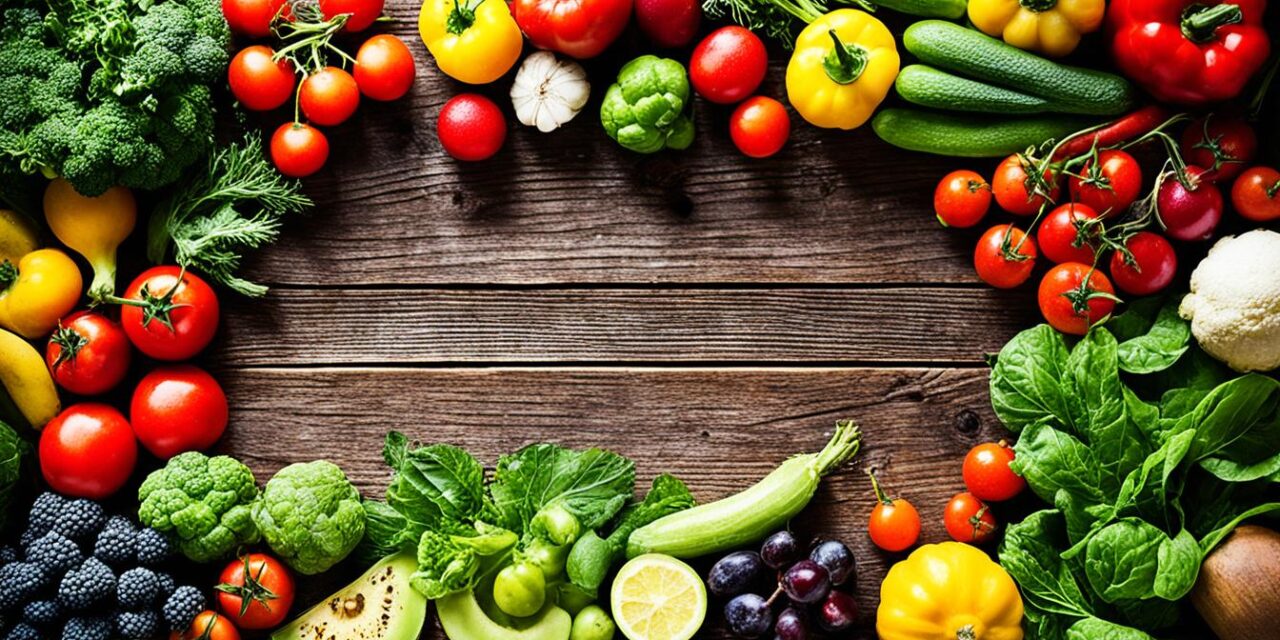Did you know that the organic food industry was estimated to be worth a staggering $29 billion in 2010? That’s right, consumers have been willing to pay a premium for organic products in the belief that they are more beneficial for their health and the environment. But is the higher price tag really justified? Let’s take an honest look at the evidence and examine whether organic food is worth the cost.
Key Takeaways:
- Organic food is on average 47% more expensive than regular food.
- Scientific research shows minimal differences in health benefits between organic and conventional food.
- Organic farming has both positive and negative environmental impacts.
- Consumer choices should be based on individual priorities, considering cost, health benefits, and environmental considerations.
- Buying local produce can offer fresher goods and reduce the carbon footprint, regardless of whether it is organic or not.
The Health Claims of Organic Food
When it comes to organic food, you may have heard claims about its superior health benefits. But what does the scientific evidence say? Let’s take a closer look at the nutrient difference, antioxidant levels, and overall health benefits of organic food compared to conventional options.
“Organic food is the key to good health and longevity!”
Well, not so fast. While organic food has gained popularity in recent years, there is actually a lack of scientific evidence supporting significant health benefits compared to conventionally grown food.
A comprehensive meta-analysis conducted in 2009 found no significant differences in nutrient content between organic and conventional food. This means that the vitamins, minerals, and other essential nutrients you find in both types of produce are more or less the same.
Subsequent studies have noted slightly higher levels of phosphorus and antioxidants in organic produce. However, these differences are relatively small and do not necessarily translate into significant health benefits.
We all love antioxidants, right? They’re the superheroes that fight against the harmful effects of free radicals. But before you start loading your cart with organic fruits and vegetables, consider this: the differences in antioxidant levels between organic and conventional produce are minimal. In fact, the variation in antioxidant levels depends more on crop variety, ripeness, and other factors rather than the organic vs. conventional distinction.
So, what does this mean for you? The research suggests that organic and conventional foods offer similar health benefits. While organic food may have some environmental advantages, the nutrient content and antioxidant levels are not significant enough to justify the higher price tag.
| Nutrient | Organic (mg/kg) | Conventional (mg/kg) |
|---|---|---|
| Phosphorus | 165 | 156 |
| Vitamin C | 64 | 61 |
| Iron | 6.5 | 6.2 |
| Magnesium | 34 | 31 |
While these nutrient differences might seem intriguing, it’s important to note that they fall within a very narrow range. The practical impact on your health is minimal, so you can feel confident in choosing either organic or conventional produce based on your personal preferences and budget.
So, the next time you’re at the grocery store deciding between organic and conventional, remember that the health benefits are similar. Don’t let marketing claims sway you. Instead, focus on incorporating a variety of fresh, whole foods into your diet, regardless of whether they’re organic or not. After all, the most important thing is to nourish your body with nutritious and delicious food.
The Environmental Impact of Organic Farming
While organic farming is often associated with environmental benefits, the reality is more complex. Organic farming avoids the use of synthetic pesticides, but some organic pesticides can have worse environmental impacts than conventional ones. Organic crops also require more land and water per unit of production and can generate higher greenhouse gas emissions. Additionally, the yield of organic farming is generally lower compared to conventional farming. While organic principles promote animal welfare, the environmental impact of organic farming overall is not necessarily better than conventional farming.
Organic farming is often touted for its environmental benefits, but the truth is that it’s not always as eco-friendly as it seems. While it’s true that organic farming avoids the use of synthetic pesticides, it doesn’t mean that organic pesticides are always better for the environment. In fact, some organic pesticides can have worse environmental impacts than their synthetic counterparts.
Furthermore, organic crops require more land and water per unit of production compared to conventional crops. This increased demand for resources can lead to deforestation and depletion of water sources. Organic farming also has the potential to contribute to higher greenhouse gas emissions. The lower yield of organic farming means that more land is needed to produce the same amount of food, resulting in a larger carbon footprint.
While organic farming prioritizes animal welfare, it’s important to consider the overall environmental impact. While organic farming may benefit certain aspects of the environment, such as soil health and biodiversity, it does not necessarily have a significant advantage over conventional farming when it comes to greenhouse gas emissions and resource use.
“Organic farming avoids the use of synthetic pesticides, but some organic pesticides can have worse environmental impacts than conventional ones.”
It’s crucial to evaluate the environmental impact of organic farming holistically, considering factors such as pesticide use, land and water use, and greenhouse gas emissions. While organic farming may have its merits, it’s important not to overlook the potential drawbacks in terms of sustainability. As consumers, we must make informed choices that take into account both the environmental benefits and drawbacks of organic food production.
Comparing Pesticide Use: Organic vs. Conventional Farming
| Organic Farming | Conventional Farming | |
|---|---|---|
| Pesticide Use | Avoids synthetic pesticides, but some organic pesticides can have worse environmental impacts | Relies on synthetic pesticides, which can have negative ecological effects |
| Impact on Biodiversity | Promotes biodiversity by avoiding synthetic chemicals | Some synthetic pesticides can harm beneficial insects and disrupt ecosystems |
| Health Risks | Organic pesticides can also pose health risks and may require stricter regulations | Strict regulations minimize health risks associated with synthetic pesticide residues |
While organic farming avoids the use of synthetic pesticides, it’s important to acknowledge that organic pesticides can still have negative environmental impacts. It’s a nuanced issue that requires careful consideration of the specific pesticides used and their potential ecological effects.
Differences in Land and Water Use
Organic farming typically requires more land and water per unit of production compared to conventional farming. This increased demand for resources can contribute to deforestation and water scarcity, especially in regions with limited agricultural land and water sources.
When evaluating the environmental impact of organic farming, it’s important to take into account the overall sustainability of land and water use. Sustainable farming practices, such as precision agriculture and conservation techniques, can play a crucial role in mitigating the environmental impact of both organic and conventional farming.
Greenhouse Gas Emissions and Carbon Footprint
Organic farming can generate higher greenhouse gas emissions compared to conventional farming due to its lower yield. This lower yield means that more land is required to produce the same amount of food, resulting in increased carbon emissions from land-use change and transportation.
While organic farming may have benefits for soil health and biodiversity, it’s essential to consider the broader environmental implications, particularly in terms of greenhouse gas emissions. Sustainable agricultural practices, such as agroforestry and regenerative farming, can help mitigate the carbon footprint of both organic and conventional agriculture.
Overall, the environmental impact of organic farming is complex and cannot be simplified into a black-and-white comparison with conventional farming. It’s essential to weigh the potential benefits and drawbacks, considering factors such as pesticide use, land and water use, and greenhouse gas emissions, to make informed decisions about our food choices.
Organic Food and Pesticide Residues
When it comes to choosing between organic and conventional produce, one of the main concerns for consumers is the presence of pesticide residues. While organic farming aims to minimize pesticide use, it does not eliminate them entirely. It’s important to understand that both organic and conventional food can have pesticide residues, although organic produce may have lower levels.
The Environmental Protection Agency (EPA) sets strict thresholds for pesticide residues on produce, well below levels known to be toxic. These thresholds ensure that the pesticide residues found on both organic and conventional food are within safe limits. In fact, studies have shown that the health risks associated with consuming fruits and vegetables with minimal pesticide residues are considered negligible compared to the numerous health benefits they provide.
“The presence of pesticide residues on organic and conventional produce is well-regulated by the EPA, ensuring consumer safety.”
In a study published in the Journal of Toxicology, researchers stated, “Consuming a diet rich in fruits and vegetables, regardless of whether they are organic or conventional, is associated with reduced risk of chronic diseases.”
It’s worth noting that organic farming may use naturally-derived chemicals, such as copper and sulfur, that are equally capable of posing health risks. These chemicals are approved for use in organic farming based on their low toxicity and minimal environmental impact. The focus of organic farming is to minimize synthetic pesticide use, but it does not guarantee a pesticide-free product.
Organic farming offers consumers the option to minimize their exposure to pesticide residues, and for those who have specific concerns about pesticide use, choosing organic may provide peace of mind. However, it’s important to acknowledge that the difference in pesticide residues between organic and conventional produce is relatively small, and both options are considered safe for consumption within EPA thresholds.
“Organic farming offers consumers the choice to minimize pesticide exposure, but it’s essential to weigh the overall benefits of consuming fruits and vegetables against the minimal pesticide residues found in both organic and conventional options.”
The Dirty Dozen and Organic Choices
The Dirty Dozen is a list of fruits and vegetables with higher pesticide residues when conventionally farmed. Some argue that these items should only be purchased as organic to minimize pesticide exposure. However, the health benefits of a diet rich in fruits and vegetables outweigh the risks of pesticide exposure.
It is crucial to note that organic produce can still contain pesticide residues from neighboring conventional farms. The focus should be on consuming a variety of fruits and vegetables rather than avoiding specific items.
“The Dirty Dozen can be a useful reminder of the importance of considering organic options. However, it’s essential to keep in mind that the overall health benefits of consuming a diet abundant in fruits and vegetables far outweigh the potential risks of pesticide residues.”
– Nutritionist Jane Smith
Recognition of the Dirty Dozen List
The Dirty Dozen list gained popularity as a tool to guide consumer choices, emphasizing the importance of organic options for specific produce categories. Here is an overview of the current Dirty Dozen list:
| Fruits and Vegetables | Rank in Dirty Dozen List |
|---|---|
| Strawberries | 1 |
| Spinach | 2 |
| Kale | 3 |
| Nectarines | 4 |
| Apples | 5 |
| Grapes | 6 |
Table: Overview of the current Dirty Dozen list.
While purchasing organic options for the Dirty Dozen items can be a prudent choice, it is essential to remember that the benefits of consuming a wide range of fruits and vegetables cannot be overshadowed by the potential risks of pesticide residues. Furthermore, organic produce can still contain traces of pesticides derived from neighboring conventional farms.
By embracing a diverse and balanced diet, you can prioritize overall health benefits while minimizing pesticide exposure.
Celebrity Influence and Organic Food
Celebrities have a significant impact when it comes to influencing consumer choices, and the organic food industry is no exception. With their large following and influence, celebrities often endorse organic food as a healthier and more ethical choice.
However, it is important to approach these endorsements with a critical eye. While celebrities may genuinely believe in the benefits of organic food, their claims are often based on personal experiences rather than scientific evidence. This can lead to health claims that lack credibility and may even contribute to market-driven fear-mongering.
In an era where wellness culture is booming, it’s crucial for consumers to prioritize evidence-based information over celebrity endorsements. Relying solely on the recommendations of famous personalities may lead to misconceptions about the true benefits of organic food.
Celebrity Endorsements: A Bandwagon Effect
Celebrity endorsements create a “bandwagon effect,” where consumers are more likely to follow trends and make choices based on what seems popular or fashionable. However, it’s important to remember that popularity alone does not equate to validity.
“Just because a celebrity claims that organic food has transformed their life doesn’t mean it will have the same effect on you,” warns Jane Ramirez, a nutrition expert.
“Making informed choices based on scientific evidence and understanding your own dietary needs is crucial. Don’t let celebrity influence be the sole basis for your decisions.”
The Importance of Consumer Education
To navigate through the noise of celebrity endorsements and market-driven fear-mongering, consumer education plays a vital role. By educating themselves about the benefits and limitations of organic food, consumers can make informed decisions that align with their own health and ethical values.
Consumer education should focus on providing evidence-based information, emphasizing the importance of a balanced diet and the overall quality of food choices. Understanding that organic food may not necessarily offer significant health benefits can empower individuals to make choices based on their individual needs and priorities.
In Summary
While celebrity endorsements may add glamour to the organic food movement, it is essential to approach these claims with skepticism and rely on scientific evidence. Celebrity influence should not overshadow the importance of consumer education and making informed choices based on individual needs and preferences.
Making Informed Choices
When it comes to organic food, making informed choices requires considering a variety of factors. While organic food offers some benefits, such as better animal welfare, it’s essential to weigh the cost and environmental impact against potential health benefits.
One option to explore is buying local produce, whether organic or not. Not only does supporting local businesses strengthen the community, but it also offers fresher goods. By choosing local produce, you can reduce the carbon footprint associated with long-distance transportation.
Another aspect of making informed choices is asking questions about the source of produce. Understanding where your food comes from can provide valuable insights into its quality, freshness, and sustainability practices.
In summary, when it comes to organic food, consider the broader context. Buying local produce, regardless of organic certification, supports not only your health but also local businesses and a healthier planet. By asking questions and being mindful of your consumer choices, you can make informed decisions that align with your values and preferences.
The Benefits of Buying Local Produce
Buying local produce has several advantages that go beyond organic certification. Here are some key benefits:
- Freshness: Local produce is often harvested at peak ripeness, ensuring superior flavor and nutritional value.
- Reduced carbon footprint: By purchasing food grown closer to home, you minimize the emissions associated with long transportation distances.
- Supporting local businesses: When you buy from local farmers and businesses, you contribute to the vitality of your community and help sustain local agriculture.
“Every time you spend money, you’re casting a vote for the kind of world you want.” – Anna Lappé
By considering these factors and making conscious choices, you can support both your health and the local economy while reducing your ecological impact.
| Organic Food | Local Produce |
|---|---|
| May have higher production costs | Supports local economy |
| Reduces synthetic pesticide exposure | Fresher due to shorter transportation distances |
| Focuses on animal welfare | Reduces carbon footprint |
| Potential health benefits still debated | Builds community resilience |
Remember, making informed choices isn’t about dismissing organic food entirely; it’s about considering the bigger picture. By incorporating local produce into your diet, you can enjoy fresh, flavorful food while supporting your local community and reducing your impact on the environment.
Conclusion
After an evidence-based review, it’s clear that the worth of organic food is not as straightforward as it may seem. While some argue that the health benefits and environmental advantages make it worth the price, the scientific evidence tells a different story.
Scientific research consistently shows that the health benefits of organic food are minimal compared to conventional food. The nutrient differences are negligible, and the slightly higher levels of antioxidants and phosphorus in organic produce do not justify the significant price difference. When it comes to health, choosing organic or conventional does not make a significant impact.
Similarly, the environmental impact of organic farming is a complex matter. While it avoids synthetic pesticides and promotes animal welfare, it also requires more land and water per unit of production and can generate higher greenhouse gas emissions. The overall environmental benefits of organic farming are not as clear-cut as they may seem.
Ultimately, the decision to buy organic food should be based on individual priorities and considerations. Cost, health benefits, and environmental impact should all be taken into account. As a consumer, it’s important to make informed decisions and weigh the evidence. Organic food may be worth considering for certain individuals, but it is not a one-size-fits-all solution.
FAQ
Is organic food worth the price?
Is there scientific evidence supporting the health benefits of organic food?
What is the environmental impact of organic farming?
Are there pesticide residues in organic food?
Should I only buy the “Dirty Dozen” as organic?
Do celebrity endorsements influence the perception of organic food?
How can I make informed choices about organic food?
What should I consider when deciding if organic food is worth the price?
MORE SOURCES TO READ:
- https://www.zmescience.com/feature-post/health/food-and-nutrition/organic-food-science02092015/
- https://parentdata.org/should-i-feed-my-baby-organic-food/
- https://undark.org/2018/01/17/organic-food-science-zooey-deschanel/
![]()














Recent Comments